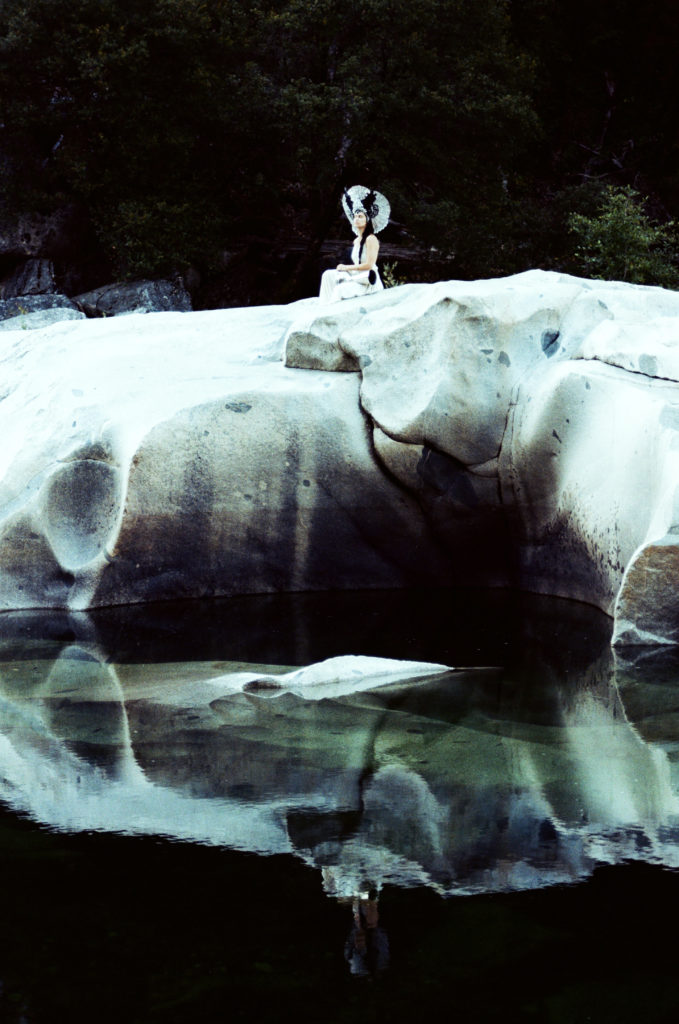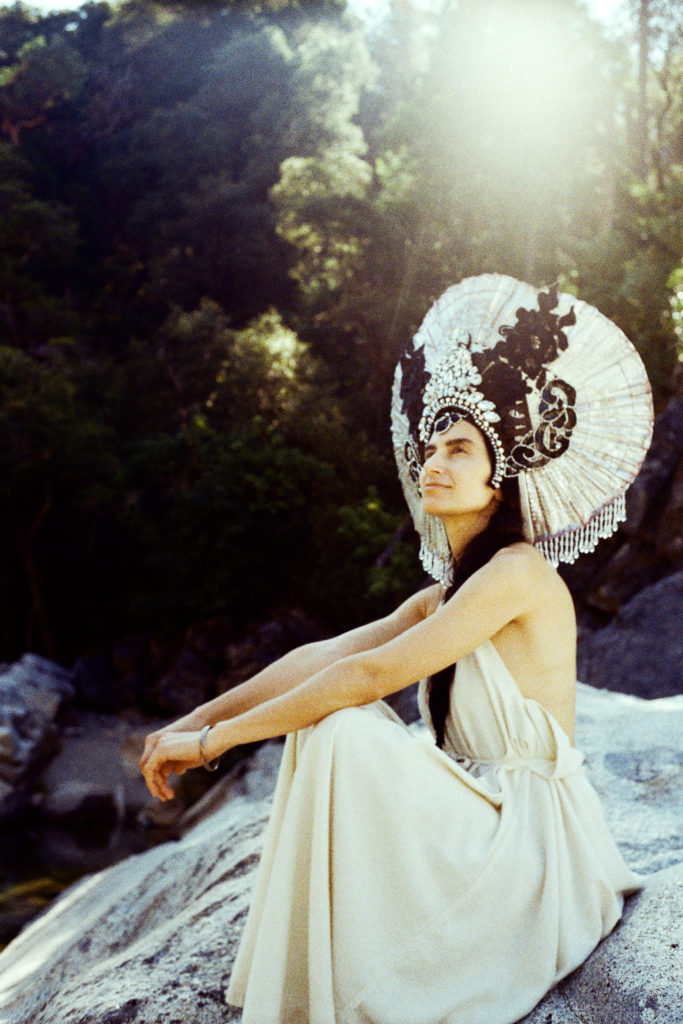The ethereal
Simrit Kaur's singing voice is the product of many generations and legacies. Simrit was adopted from Greece by a Greek-American family in the Southern United States, and while her birth family was known for their musical talent, her adoptive family was also instrumental in nurturing the young Simrit's gifts. Soon after Simrit discovered Kundalini yoga, she fused her passion for singing with her devotion to her practice. Currently a practitioner of both
Kundalini and
Naad Yoga (the yoga of sound and consciousness), Simrit travels around the world to share her songs and her humble wisdom with others. Simrit is currently on tour in support of her new album,
Songs of Resilience, and she comes to Asheville's Masonic Temple on Saturday, March 18th.
Tickets are on sale now.
The album is a gorgeous meditation on the human experience, especially the quality of resilience. Simrit sings in multiple language, but regardless of your knowledge of, say, Sanskrit, the message—of hope and beauty in the face of challenge, of
strength in the midst of darkness—is clear. These are songs of devotion, but one need not come to Simrit with a spiritual practice to take something from her performance. The album touches on something true about the human condition in all of its gorgeousness and frailty.
I interviewed Simrit about her career,
Songs of Resilience, her spiritual practice, the cultural appropriation of yoga in the West, and her upcoming show in Asheville. Even via e-mail Simrit comes across as elegant, poised, and very gracious. Seeing her at the beautiful
Masonic Temple in downtown Asheville will be a particularly special experience.
Q: From the interviews I've read, singing seems to have always come easily to you. At what point did you decide to pursue music as your profession? What was that like for you when you started? How has it evolved?
A: Yes, singing has come easy for me as I have a deep well of creativity that is constantly giving me melodies and rhythms....however, just because I have a raw talent with singing, doesn't mean I don't need to practice. I practice my craft on a daily basis to keep up. So I do my vocal drills and my scales, etc. on a daily basis. So don't let the ease of the concert fool you. All of us in the band practice a lot, and we have a history of thousands of hours of practicing our craft. It takes a lot of continual practice.
I was also born of a singer, so I think that helps a lot, too. I decided about 4 years ago to really make music my profession. Before that, I was just messing around. I put my first two albums out and didn't even market them.
Once I realized that I had the drive to make it happen, and I couldn't sit and wait around for anyone to do it for me, then I really started cookin', and I love working on my music business. It's a constant evolution in art for me. I've also been studying, practicing, and playing music from the time I was a little child. It's been a huge and integral part of my life.
Q: There is so much discussion right now about yoga and cultural appropriation. What are your thoughts on this topic, and where do you see yourself (if at all) entering this discussion? How does music work within this discussion?
A: Personally, I think there is a lot of BS in the world of "yoga" in the west. I don't personally resonate with a lot of the ways in which people glamorize it, Hollywood slick it and try to make it "cool", and all types of other stuff. There are a lot of wolves in sheep's clothing, too, just like in any scene. Yeah, to me...it's a scene here...I don't feel the authenticity of it in most people, but there are those who are in integrity with their own hearts and their minds, and that is what I call Yoga. A yogi has nothing to do with going into a yoga studio and practicing exercises and breathing, etc. A true yogi is someone with grit, someone who is grounded, kind, and in integrity.
 Q: I read that your first performance was in a yoga class. Have yoga and music always been tied for you (at least since you started practicing)?
A:
Q: I read that your first performance was in a yoga class. Have yoga and music always been tied for you (at least since you started practicing)?
A: Music and Yoga classes have not always been tied for me. However, Real Music is Yoga. They are the same thing. Music has a deep meaning for me. It's not just audible sound that someone makes music. It's about the feeling. Anyone can make sounds happen and call it music. In fact, there is a lot of that in today's world, as anyone has access to sonic sounding boards and can make music at their fingertips....however, it doesn't mean anything. Real music and Real musicians are in a state of Yoga, although they may not call it that. Real music and real musicians have Grit. Real Music has Soul in it. Not everything you hear these days is soulful music.
Yoga is a state of being, not what you do in a class or on a mat, although many have adopted that word in this country as something that you ''do". The actual definition of the word, Yoga, means "united" or "joined." So lots of people practice exercises and meditations to experience the state of Yoga. Well, if you are truly in the music (not just playing a bunch of notes and singing a bunch of notes and words, but actually fully annihilated in the music), then you are in a state of yoga. I experienced this as a young child singing ancient Byzantine music in the Greek Orthodox church, so I don't equate music and yoga classes as being tied for me. Music is Music, and people who die in the music are the true musicians.
Q: Have spirituality and music always gone hand in hand for you?
A: Music is Spiritual. Everything is spiritual. So I don't see how anything could be separate from spirituality.
Q: There is an assumption (on the part of some) that a spiritual person must divorce him/her/themselves from the material world. Your music, however, seems to me to be both grounded in our present moment and transcendent. Can you talk a bit about this balance?
A: That assumption is called dogma, and it's a huge turn-off to me. "Music" without grit, is no music at all. In my experience, music encompasses the heavens AND the earth. In order for something to be transcendent, it needs to connect to us first and then transcend us. If there is no grounding element in the music, how can it connect? What's so transcendent about real music, is the ability to reach in and genuinely connect instantly. When we feel that genuine connection, then we transcend time and space.
 Q: Do you feel like your composition process is spiritual or inspired in some way? Can you talk about your process a little?
A:
Q: Do you feel like your composition process is spiritual or inspired in some way? Can you talk about your process a little?
A: My process varies each time, but mostly I hear the melodies and feel the rhythm right off the bat, and then I compose and arrange from there. Most of the time I hear the whole orchestrated composition in my head, so I flesh out the details one step a time on a recorder. I always carry a recorder around with me. It's one of my closest allies in the music.
Q: What is your favorite spiritual text--or what is one you've read recently or gone back to recently that you love (and why)?
A: One of the best books I've ever read is
The Mysticism of Sound and Music by Hazrat Inayat Khan. It's the musician's bible, in my experience. He's right on about real music, and he's a mystic. One of my greatest music teachers, indeed, although I never met him in person. He died in the early 1930's.
Q: What is one text, action, practice that you would recommend people all over the world read or take up?
A: Gratitude for what you have and Gratitude for what you don't have. Hahaha.
Q: Songs of Resilience
was released last year but seems so relevant at this particular moment--have you thought about its applicability in the current socio/political climate? Was that something you were thinking about during your composition and production process?
A: Songs of Resilience is about the human condition. We have been resilient through the tests of time, from time immemorial. I have always been inspired by the resiliency of my parents.They adopted two orphans from Greece, totally unrelated, and they gave my brother and me a chance to feel loved, a chance to experience life. None of us in my family are blood related, and it takes a lot of courage,strength, and love to adopt and raise children with such elegance.
I also think about my own life experience, and I feel the resilience in myself and have witnessed the resilience in many challenging situations. These situations have strengthened me even more, and that is what I call resilience. I've always been inspired by human rights activists and their resiliency. The inspiration for all of my albums comes from life and the humans that live it.
Q: What can people expect from your live performance? Will you be joined by other musicians on stage (from the album or otherwise)?
A: I only know what my own experience is, but from what people tell us, our live performance is a big experience. We've heard the word "epic" a lot. It's highly engaging and hypnotic at the same time. Some songs will get you off your seat and some will have you at the edge of your seat. This is what people tell us.
Yes, my full band will be on tour with me. So expect a full and eclectic sound. We have West-African Kora, Guitar, Cello with electronics, World beat percussion, electric bass, harmonium and vocals. It's a full-on sound with a lot of dynamic. We are really excited to see y'all soon!
